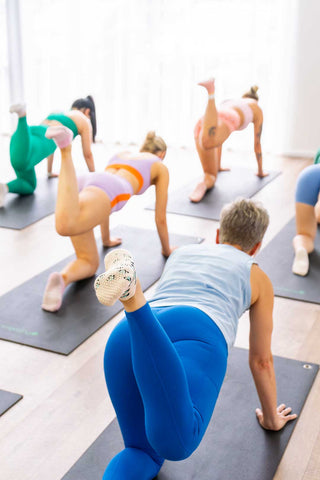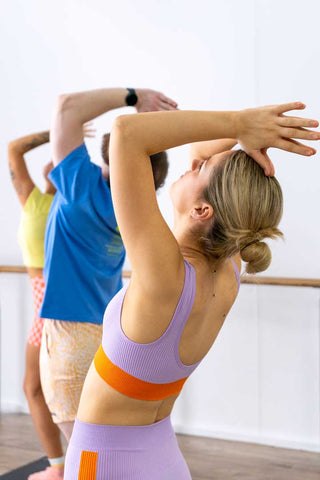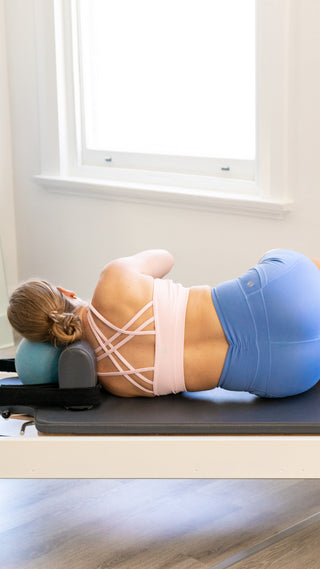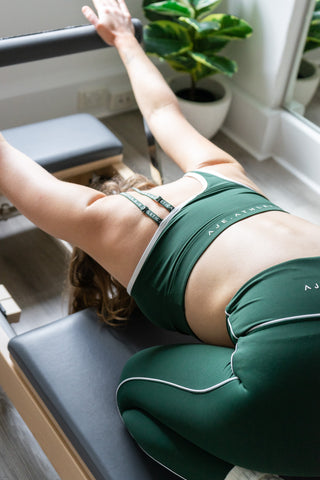
Are You Postnatal & Wondering About Exercise?
A guide to postnatal musculoskeletal recovery + our best group classes for you
If you’re a brand new parent, we hope you’ve found a nourishing postnatal care routine, and have snuggled into life with your adorable little bean!
Are your kids a bit older? This is still relevant to you – the physiological effects of the postnatal period can trickle through the years.
Can we be bold?
Pilates is hands-down the best strengthening for mind and body in women who’ve birthed babies.
With a strong core comes integrity in all movement, physical and otherwise – which is helpful, because babies get heavy, and parenthood can be tricky to navigate!
Come with us to decompress and replenish your resources, so you can return to your wonderful babe with strength and presence.
Our studios are home to nurturing instructors to help you understand, and move in, your new body.
When is it safe to begin group exercise classes in the postnatal period?
The short answer
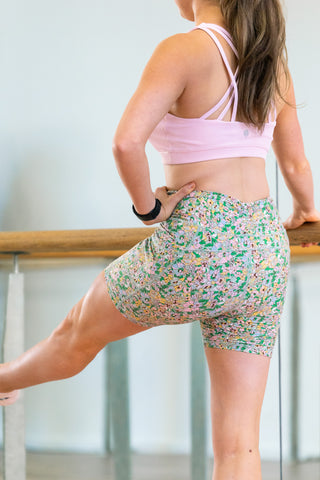
The ins & outs
Some health professionals advise waiting 12 weeks after a C-section. Please seek advice about this from your perinatal healthcare provider during your 6-week appointment and listen to your body.
For anyone returning to movement post-birth, our instructors will guide you to build up gradually, with movement variations to consciously strengthen the muscles around your ribcage, spine and hips.
We encourage you to begin with a focus on breathing well, waking up your postural muscles (the ones that are super tired from holding a bebe!), and pelvic floor awareness, while avoiding heavy or high-impact exercises that induce bearing down on your pelvic floor (i).
If you have any concerns about starting exercise, please seek advice from your doctor, midwife or physio, and listen to your body, to determine the right time for you.
Looking for workouts designed just for the needs of prenatal and postnatal women? Our Physio-Led Prenatal & Postnatal Pilates just landed!
From March 2024, Glide Clinical Pilates women’s health physiotherapist Ellie Parnell offers these nourishing, educational classes at our Magill Rd studio!
As for the long-winded rap about returning to movement postnatally, here we go.
Your postnatal rhythm
Your priorities, feelings and motivations are ever-shifting at this point. Here’s an adaptable guide to how you can empower yourself through movement in this new life, honouring the incredible feat your body has performed (legit you just grew and birthed a baby).
Remember, this is a guide.
Postnatal care involves checking in with yourself! Your return to exercise will depend on a forest of circumstances, including baby’s (and your own) sleep and feeding, your hormones and mood, and your birth experience.
We’re here when you’re ready.
Our postnatal rhythm guidelines come from resources including women’s health physio and Aleenta senior instructor Ellie Parnell, of Glide Clinical Pilates; AUSactive; & Embrace Physiotherapy.

What are the benefits of postnatal exercise?
Your mind and body are part of the same ecosystem and physical exercise promotes the cyclical health of this whole entity!
Your amazing systems – from nerves, breath and blood flow to cell growth, digestion, muscle metabolism, and organ function – impact upon, and are impacted by, each other.
Postnatal exercise will:
- Restore muscle tone
- Prevent back, shoulder and neck pain
- Improve cardiovascular (heart & lung) function
- Reduce the risk of postnatal anxiety & depression
- Improve your mood, and
- Promote resilience
In our guide to prenatal exercise(link to page), we touched on how regular aerobic exercise can minimise the risk of mental health issues.

Feel-good-and-chill neurotransmitters (endorphins & serotonin) are released in your brain when you exercise (ii), and these keep in check your stressy visceral run-away-from-the-lion hormones (cortisol & adrenaline).
This can be handy when you have a tiny baby! The link between sleep-debt, stress hormones, physical health and neurological stability is well-documented (iv).
You may not be in immediate peril but, when you’re sleep-deprived, lots of small stresses make your tired brain detect danger and this results in overwhelm, anxiety and that feeling like you just can’t cope.
Load up on endorphins when you can!
A balance of classes that strengthen the body and restore nervous systems can also help minimise the risk of postnatal depletion (v).
It’s important to find the right physical movement for you – if it makes you feel good, you’re likely to keep doing it!
Which brings us to…

“[Matrescence] is a change in multiple domains of your life. You’re going to feel it perhaps bodily, psychologically. You’re going to feel it with your peer groups. You’re going to feel it at your job. You’re going to feel it in terms of the big philosophical questions.”
– Aurélie Athan
Which Aleenta classes are good for postnatal women?
Did someone say pelvic floor? These classes are especially awesome for postnatal bodies when you first return to (or start for the first time!) moving with us.
Remember, if you can’t get to the studio but love our vibe, we have a posy of classes you can Livestream!

Physio-led Postnatal Pilates!
Magill Rd only
An education. Glide Clinical Pilates physiotherapist Ellie Parnell will lead specialised Pilates for pregnant and postnatal women, designed to elevate your understanding of moving your body in the best way for you. Her classes are designed to help you feel at home in your own skin, and strengthen your body with enhanced confidence, as you move through the perinatal period.
Important: Prior to 16 weeks postpartum, or if you’re new to moving with us, please steer clear of Plus+ classes, Strong Flow Yoga, Circuit, or anything else bouncy. If you’re unsure, talk to us – hello@aleenta.club or check out our class descriptions.
Please note: these smaller classes (capped at 8 people) are combined prenatal-postnatal sessions, and individual client needs will be managed accordingly. To claim physio-led classes through your private health fund, you’ll first need to book a private 30 minute physiotherapy assessment with Ellie.
Your postnatal undertaking is to enjoy classes that are appropriate for your energy levels and experience, honouring the constant changes in your body.
Our instructors will help you find the best variations to accommodate your needs, so you can adjust your workout with a balance of education and intuition.
Your postnatal workout checklist
What you need before joining our Yoga, Mat & Reformer Pilates, or Barre classes (besides your grippy socks, always and forever!).
Still not sure where to begin?
Does your brain feel like a washing machine? Let’s reset.
A pre-exercise assessment with a women’s health physio is a great place to start. This can help you tune into your body, care for any postnatal physical discomfort or issues, and firm up your understanding of which classes are good for you.
If you think you’d benefit from extra support, here’s a breakdown of the differences between physio and regular group classes.

We like to work with your health professionals, so if you have any medical conditions, concerns or prescribed exercises, we’ll do our best to support you in line with your health/treatment plan!
We’re here to chat anytime about the best class and membership options for you, as you let the joy of movement accompany you on this incredible journey! Please email hello@aleenta.club for a chat with one of our amazing humans.
Postnatal FAQs
If you or anyone you know requires mental health support, help is available from your healthcare provider or via the numbers below.
PANDA Perinatal Mental Health Helpline
Mon – Sat | 1300 726 306
Lifeline
24 hours | 13 11 14
References
(i) AUSactive. (n.d.). Pregnancy & Postnatal Exercise Guidelines [Fact sheet]. ausactive.org.au/wp-content/uploads/2023/03/AUSactive-Pregnancy_Post-Natal-Exerci se-Guidelines-FINAL-v2.pdf
(ii) Jodi L. Pawluski, Ming Li, Joseph S. Lonstein. (2019, March). Serotonin and motherhood: From molecules to mood. Frontiers in Neuroendocrinology, 53.
https://www.ncbi.nlm.nih.gov/pmc/articles/PMC6541513/
(iii)Harvard Health Publishing. (2020, 07 July). Exercising to relax. Harvard Medical School. www.health.harvard.edu/staying-healthy/exercising-to-relax
(iv) Tahmasian, M., Samea, F., Khazaie, H. et al. (2020, 02 June). The interrelation of sleep and mental and physical health is anchored in grey-matter neuroanatomy and under genetic control. Communications Biology, 3(171) https://doi.org/10.1038/s42003-020-0892-6
(v) Drop Bio Health. (2023). Wondering what postnatal depletion looks like? Insights from leader in mother care, Dr Oscar Serrallach.www.dropbiohealth.com/health-resources/postnatal-depletion-dr-oscar-serrallach#:~:text=Dr%20Serrallach%20describes%20postnatal%20depletion,%2C%20mental%2C%20and%20emotional%20factors


